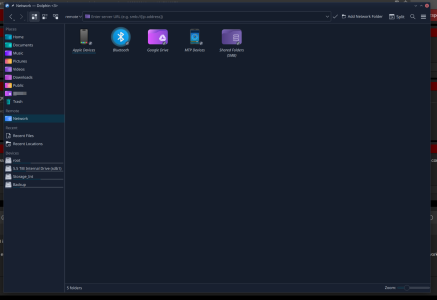Deadjasper
2[H]4U
- Joined
- Oct 28, 2001
- Messages
- 2,584
I'm using the Connect to Server command in Nemo to connect to mainly Windows shares and it works well but even tho I check the remember password box it doesn't seem to remember anything. Is there a way to establish connections and have them remembered? Like Remmina does so from then on it's just one click to connect. In networking, Windows Network shows up but it's always empty. Don't really want to beat that dead horse again. Connecting to my FreeNAS box has always worked properly but not Windows, it never has.
Thanks
Thanks
![[H]ard|Forum](/styles/hardforum/xenforo/logo_dark.png)
